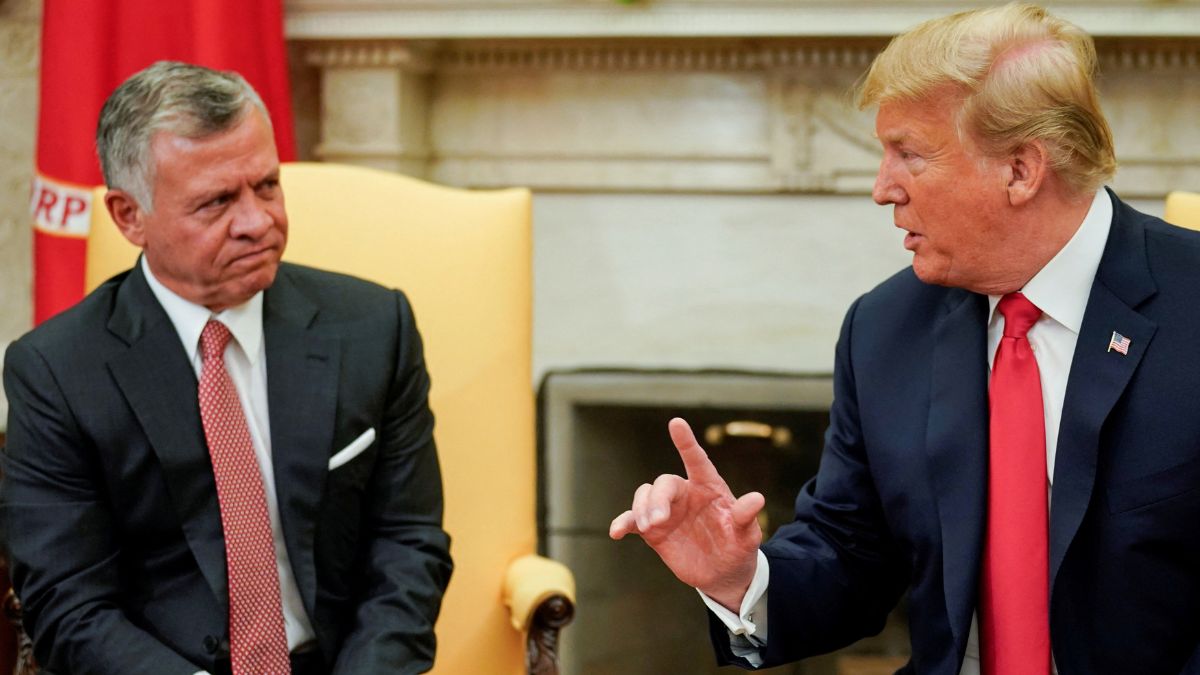Jordan’s King Abdullah II is set to meet with United States President Donald Trump in Washington, DC, at a time when Trump is pressuring the Jordanian leader to accept displaced Palestinians from Gaza.
Trump has suggested that Jordan and Egypt should take in Palestinians from the war-ravaged enclave, even though both countries have strongly opposed the idea.
This move has placed King Abdullah in a difficult position, given Jordan’s reliance on US financial aid and its already delicate domestic situation.
Trump first raised the idea alongside Israeli Prime Minister Benjamin Netanyahu, suggesting that Palestinians should be “removed” from Gaza permanently.
Trump’s comments have drawn widespread condemnation , not only from Jordan but also from Egypt, Saudi Arabia, the United Arab Emirates, and Qatar.
The proposal is seen as an attempt to forcibly displace Palestinians, a move that echoes historical events such as the 1948 Nakba , during which hundreds of thousands of Palestinians were expelled from their homes.
US aid = Leverage
A key element in Trump’s pressure campaign is the US financial support for Jordan. In 2023, Jordan was the fourth-highest recipient of US foreign aid, receiving $1.72 billion. Trump has indicated that this aid could be withheld if Jordan refuses to comply with his plan.
“If they don’t agree, I would conceivably withhold aid,” Trump said ahead of his meeting with King Abdullah. While this tactic is not new, it puts Jordan in a precarious position.
Economic struggles and high unemployment have already led to dissatisfaction among Jordanians, particularly among the influential tribal communities that form a core part of the monarchy’s support base.
Trump’s approach to foreign aid has already raised concerns in Jordan. Upon assuming office, he announced a 90-day freeze on most global aid commitments, affecting several US allies, including Jordan.
Unlike Egypt and Israel, which were given exceptions, Jordan saw its aid paused, raising concerns that future financial support could be further restricted under Trump’s administration.
Jordan not without internal challenges
Jordan is home to a significant Palestinian population, with at least 2 million registered Palestinian refugees and many more of Palestinian descent. The prospect of accepting additional displaced Palestinians from Gaza is politically untenable.
For months, protests have erupted in Amman and other Jordanian cities, denouncing Israel’s military actions in Gaza.
While demonstrations initially subsided after the announcement of a ceasefire between Israel and Hamas, Trump’s recent statements have reignited public anger. On Friday, thousands took to the streets once again to protest against the proposal to relocate Gazans to Jordan.
Historical context also plays a role in shaping Jordan’s stance. The country has absorbed waves of Palestinian refugees since 1948, and in 1970, tensions between Palestinian factions and the Jordanian government led to the violent conflict known as “Black September.”
These historical memories remain fresh, and any policy that could destabilise the demographic and political balance in Jordan is seen as a direct threat to the monarchy.
Security considerations & regional implications
Beyond economic and political considerations, Jordan’s role as a regional security partner to the US and Israel adds another layer of complexity.
Jordan has played a crucial role in countering threats from groups such as ISIL (ISIS) and has provided military assistance in protecting Israel from regional threats. In 2023, Jordan helped intercept Iranian missiles fired toward Israel, showcasing its strategic importance.
Trump’s proposal, if enforced, could severely destabilise Jordan, which would have repercussions for both Israel and the US Some opposition voices in Jordan have already suggested that the kingdom should reduce its reliance on Washington and explore alliances with other global powers such as China, Russia, or wealthy Gulf states.
Jordan is also home to around 3,000 US troops stationed there for counterterrorism operations.
However, Trump’s repeated assertions that he wants to reduce the US military presence in West Asia have raised questions about the future of these deployments. If Trump pulls troops from Syria and Iraq, as he has indicated, it could further strain Jordan’s security apparatus and alter its relationship with Israel.
What’s next
With King Abdullah’s visit to Washington , all eyes are on the negotiations between the Jordanian leader and Trump. Trump has remained confident that he can persuade Jordan and Egypt to accept Palestinian refugees, despite their repeated refusals.
“I have a feeling that despite them saying no, I have a feeling that the king in Jordan and the general in Egypt will open their hearts and will give us the kind of land that we need to get this done,” Trump said, referring to Egyptian President Abdel Fattah el-Sisi.
It remains to be seen whether Trump’s plan is a serious policy proposal or a high-pressure negotiating tactic aimed at forcing an alternative arrangement for Gaza.
Some analysts suggest that Trump’s insistence on removing Palestinians from Gaza is meant to generate discussions around rebuilding the territory, rather than a concrete plan of action.
Nevertheless, the stakes for Jordan are extraordinarily high.
Also Read | Could USAID cuts lead to US tax dollars funding terror groups?
With inputs from agencies


)

)
)
)
)
)
)
)
)



